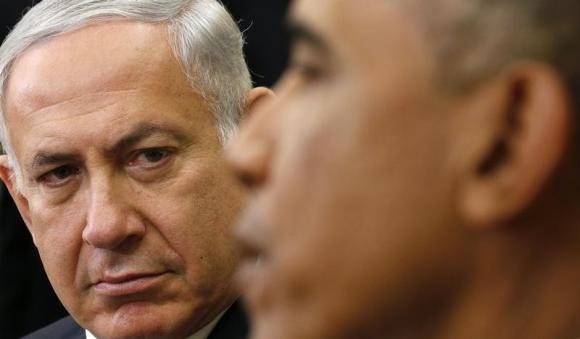 Israel's Prime Minister Benjamin Netanyahu listens as U.S. President Barack Obama (R) speaks, during their meeting in the Oval Office of the White House in Washington October 1, 2014.[/caption]
Israel's Prime Minister Benjamin Netanyahu listens as U.S. President Barack Obama (R) speaks, during their meeting in the Oval Office of the White House in Washington October 1, 2014.[/caption]Faced with an unexpectedly tough electoral challenge, (at least according to Israeli opinion polls, however unreliable they later turned out to be) Benjamin Netanyahu in the closing days of his campaign decided that his best chance to stay in power would be to tack firmly to the Rightthe hardest, narrowest, most intractable, and most prejudiced Right. After all the alarming and scaring that this prime minister has done, one of his final scares was to warn that Arab citizens of Israel would actuallyyoud better sit down before you read thisvote. This was an even more blatant, and openly racist, approach to the subject of voter turnout among opposing parts of the electorate than the enactment of voter suppression laws in the United States. But Arab citizens constitute only 20 percent of the Israeli population, so if there was any negative effect on Netanyahus re-election chances of this insult to those citizens it would have been less than the effect was, say, for Mitt Romney when Romney insulted 47 percent of the U.S. electorate.
In any event, Netanyahus political calculation was correct; he won.
For the United States, the most significant of Netanyahus statements in his appealing to the intractable Right of the Israeli electorate was to declare clearly and unequivocally his opposition to a Palestinian state. In so doing, and in affirming his determination to hold on to occupied territory, he offered no honorable alternative way to deal with the trilemma of how Israel cannot hold onto all that land and be a Jewish state and be democratic. Evidently he sees things the same way as his billionaire backer Sheldon Adelson, who said, Israel isnt going to be a democratic stateso what?
Of course, there is no surprise in the substance of Netanyahus statement. It has long been abundantly clear from the conduct of himself and his government that he has had no intention of acceding to creation of a Palestinian state, and that past remarks suggesting that he did were only window dressing. But to move from window dressing and polite fiction to open declaration nonetheless has consequences, not only for the one making the declaration but also for others who have to deal with him. There is no longer any room for plausible denial about who is opposed to a two-state solution, or for proceeding with peace processing that is based on the presumption that both parties genuinely want a deal and it is just a matter of finding the right formula and a third party making the right guarantees.
No U.S. administration, including the current one, can dodge the reality that the unresolved Israeli-Palestinian conflict, which multiple U.S. leaders have acknowledged is damaging to U.S. interests, is unresolved because one of the parties to that conflictthe one with the military power and with control of the landdoes not want it resolved, and is now even openly admitting that it does not want it resolved.
The administration also needs to realize that this is not just a problem with Netanyahu. The prime ministers explicit rejection of a Palestinian state was part of a winning electoral strategy. With all due respect to the many Israelis who do understand the trilemma, who do want to live in a democratic state, and who accept the implications regarding resolving the conflict with the Palestinians, the Netanyahu/Adelson way of looking at things will dominate Israeli policy for the foreseeable future.
A big question for the Obama administration now is: what are you going to say, and more importantly do, about all this? How will you square the realities of the continued damaging effects of the unresolved conflict, the determination of the Israeli government not to resolve it, and the extraordinary relationship that government enjoys with the United States, with the many billions in aid and all those vetoes at the United Nations? (And remember, Mr. President, that you are in the final two years of your administration and will never have to run in another election.)
A more specific question the administration is going to face in the near term is how it will react to the Palestinians effort to press their case for statehood. Netanyahus admission strips away any remaining rationale for criticizing Palestinians for advancing that case at international organizations. The rationale wasnt valid in the first place; Palestinian endeavors in multilateral organizations to work toward self-determination never were unilateral moves that jeopardized bilateral negotiations in any way. Now it is clearer than ever that the Palestinians do not have a serious negotiating partner.
By Lobe Log










